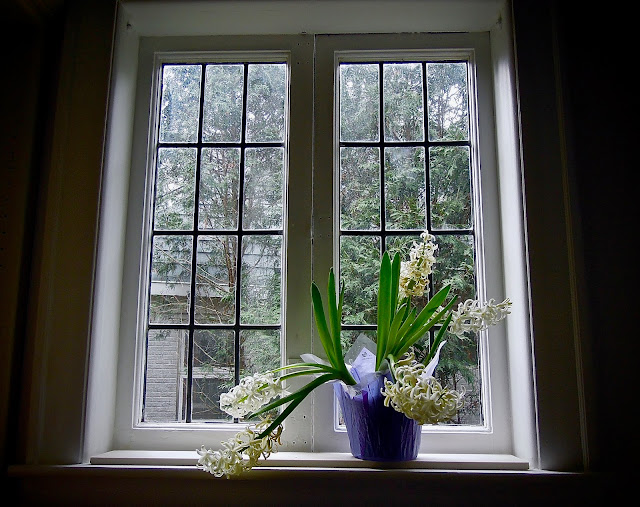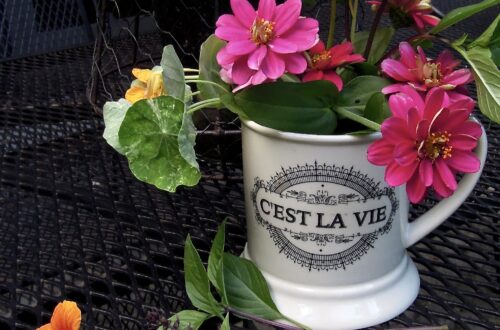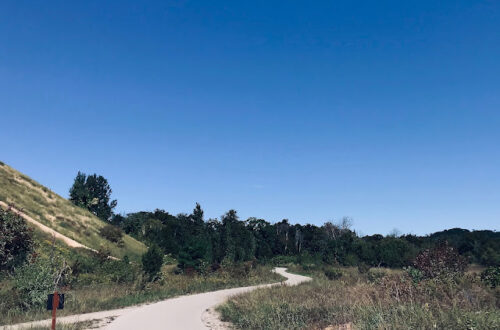
Sheltering in place at my own private Walden
“I am stockpiling antibiotics for the apocalypse, even as I await the blossoming of paperwhites on the windowsill in the kitchen.” ~Anne Lamott, Almost Everything: Notes on Hope
Sunday, March 29
An only child, I was always at ease in solitude. Growing up, I had a troop of playmates in my neighborhood, but sometimes I’d hide in my closet when they came looking for me. I read — a lot — and often preferred working on craft projects or playing alone with my menagerie of pets. As a preteen, I adopted “In My Room” (Brian Wilson/Gary Usher for The Beach Boys) as my personal anthem.
Yet I’ll be the first to agree, right now, that choosing to spend time alone and being told to self-isolate are very different options.
Last week, Michigan Gov. Gretchen Whitmer declared a statewide shutdown in response to the rapid rise of confirmed COVID-19 cases. It was a wise move — a move that should have been strategized sooner, considering that supplies at our largest hospitals were already at risk of depletion.
When the shutdown was announced on TV, the guys working on our kitchen remodeling couldn’t leave fast enough. They packed up their tools and drove off, leaving the cupboards and shelves half-finished — indefinitely. Since then, I’ve been reassembling as much as I can to make our kitchen operable again. (Luckily, the plumber installed our sink and faucet just days before the shutdown.)
Doug helps as much as possible, but he’s still in the early stages of healing from emergency surgery on his left hand. His surgeon has cancelled all office follow-up visits, due to the pandemic, which means that my cameo role as head nurse is one to be taken seriously. I continue to wash Doug’s wounds and change three layers of bandages daily. He needs an X-ray, soon, but we have no idea where or when we’ll be able to schedule it.
So here we are, alone together, wondering if life will ever be the same. Statistics rise by the hour, and the bad news keeps hitting closer to home. This morning, a neighbor emailed to tell me she just lost a beloved aunt and uncle to the coronavirus within 24 hours, and that several others in her family have been infected.
Deep listening
As a rule, I avoid spending time on the phone. I prefer conversing face-to-face in my living room or at a favorite restaurant — but recent social-distancing guidelines are changing the way I connect with loved ones.
I didn’t realize how much I missed one of my best friends until I heard her voice on my cell earlier this week. She’s known me long enough and well enough to sense when I’m not OK, or when I’m pretending not to be a quivering basket case.
She’d called to find out how I was “holding up” because she knew I wasn’t. Thanks to our conversation, I was able to process the reality of Doug’s accident and how it collided head-on with the COVID-19 pandemic. Most of my life, Doug’s strong arm has always been the one I grab whenever the train derails, but this time it was my turn to hold him up.
My friend listened deeply and quietly while I described how exhausted, short-tempered, and vulnerable I was. It helped to admit my fears aloud to another human who knows my history, and to hear a familiar, validating voice in response.
Deep listening is one of the dearest gifts we can offer each other in moments of uncertainty.
Keeping house
Meanwhile, the basic comforts of home have never seemed more essential. Domestic chores are grounding me with a sense of clarity, order, and purpose. I prepare our meals daily, relying on carry-out service only once a week. Given that it’s become a challenge to get groceries, I carefully conserve everything I have on hand, whether it’s a carton of free-range eggs or my last roll of paper towels.
While I’m cooking, I recall how my family used to tease my Scottish-immigrant grandmother, who often boasted that she never wasted a scrap of fabric or a morsel of food during the Great Depression.
I’m also spending more time making long lists for delivery services. Of course, I’d rather shop for our own groceries, but Doug’s doctor insisted that we avoid the stores. I’m usually disappointed in the quality of fresh produce delivered by Instacart and Shipt. If it isn’t spoiled or wilted, it’s out of stock. But I’m still grateful for these services.
Through it all, our home has never been so clean. Ironically, as I disinfect everything we touch, I half wonder if all the bleach and toxic chemicals in the disinfectants I’m using will kill me if the virus doesn’t. There was a time I used certified nontoxic cleansers, but here again, the pandemic has changed my daily routine.
I’m also pitching scores of household items. After spending so much time in communion with all the stuff we’ve collected, I’m questioning almost everything I thought I needed.
At the same time, I’ve unearthed some lovely, small surprises.
Last week, for instance, I found an unread copy of Anne Lamott’s latest book, Almost Everything: Notes on Hope, on a dusty bookshelf in my home office. This timely discovery was just the antidote I needed to calm my anxiety. Lamott’s rare blend of neurotic humor, unorthodox spirituality, and elegant prose speaks to my soul in ways that no one else can, especially when I’m hurting.
“We have all we need to come through,” Lamott reminds me. “Against all odds, no matter what we’ve lost, no matter what messes we’ve made over time, no matter how dark the night, we offer and are offered kindness, soul, light, and food, which create breath and spaciousness, which create hope, sufficient unto the day.”
What do we value now?
In the face of a deadly health crisis, anything trivial, extravagant, or superficial suddenly seems like a sacrilege. Our priorities are getting a loud wake-up call right now, and I’m hoping we’ll remain enlightened long after our recovery.
Every day I pause to remember our overburdened medical and health professionals, so many of whom are risking their lives (and sometimes the lives of their families) to care for patients during this nightmare. We’ve finally stopped taking them for granted and assuming they’ll always be there for us. They are getting sick and they are dying too.
Our country’s long-running, adolescent obsession with celebrity athletes and film stars seems embarrassing and foolish now. Like everyone else, I love to be entertained, yet I’ve never fathomed why we idolize and financially overcompensate people who have a talent for playing games.
Meanwhile, we’ve under-supplied our health professionals and under-funded our medical researchers, all of whom we need desperately now. Athletes and entertainers cannot save us from chronic disease, gunshot wounds, accidents, or pandemics. Ball players and entertainers deserve applause — but they aren’t heroes. Doctors, nurses, first responders, and the military are.
Waiting it out
A few days ago, there was some talk among national leaders about lifting shelter-in-place restrictions and resuming normalcy by Easter Sunday. Thankfully, today, restrictions have been extended to the end of April. While I’m worried about America’s economy, too, my immediate concern is the health and wellbeing of my loved ones, my fellow citizens.
So, here’s a memo to the White House: You won’t pry me out of seclusion until a team of respected epidemiologists and health professionals can prove the period of contagion has passed and our risk of reinfection is low. As long as it takes, I’ll wait it out.
Every day that Doug and I wake up without virus symptoms is a gift, considering that we’ve been exposed to so many people in the hospital recently. We miss our friends and family more than we can say — especially our brand-new grandson, William, who’s keeping a safe distance with his mom and dad in Ann Arbor. Our son and daughter-in-law often text us photos of the little guy, which helps, and we’re anxious for the day when we can hug them all again.
In its own subtle way, isolation has benefits. Henry David Thoreau has been trying to tell us so for well over a century. We’ve all shared his pithy quotes on social media sites while going about our business, living lives of not-so-quiet desperation. Now that we’re forced to create our version of Walden in our own homes, maybe we’ll use it as an opportunity to reconsider how we want to live when this is over.
In such a crisis, we must alter our expectations — of other people; of life itself — as surely as we adjust our daily routines.
It all boils down to the elemental. With so few places open now, there is no traffic, no more road rage, no need to rush to get anywhere else. No need to worry how my hair looks, or even bother with mascara. This time, I have no choice but to slow down, too, here in my room.
Anything important takes time, whether you’re resolving difficult problems, building relationships, healing wounds, or curing diseases. As Buddhist nun Pema Chodron wrote, “Nothing ever goes away until it has taught us what we need to know.” ~Cindy La Ferle
Photo by Cindy La Ferle



0 Comments
Sharon
Cindy, I am so glad to hear that William has arrived! We are all holding on until this too shall pass. May you and your family be well and may the time until you can all be together again pass quickly.